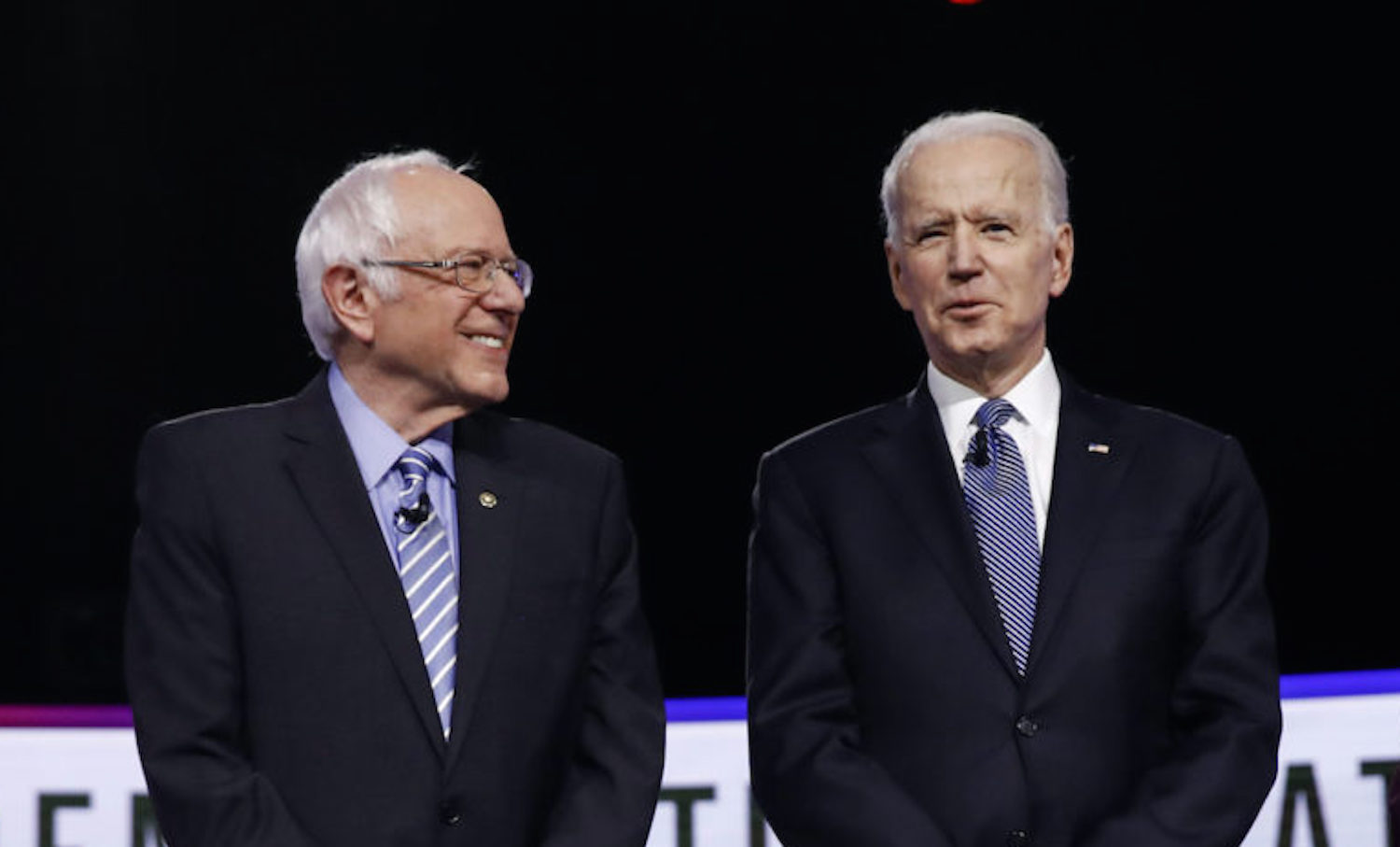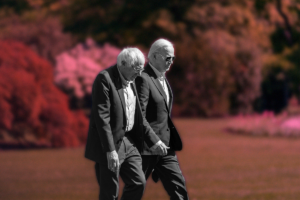Like It or Not, Donald Trump Won the Biden-Sanders Debate
Sunday’s Democratic presidential debate between former Vice President Joe Biden and Vermont Senator Bernie Sanders was extremely disappointing. Democratic presidential candidates Sen. Bernie Sanders and former Vice President Joe Biden at the Feb. 25 Democratic presidential primary debate in Charleston, S.C. (Matt Rourke / AP)
Democratic presidential candidates Sen. Bernie Sanders and former Vice President Joe Biden at the Feb. 25 Democratic presidential primary debate in Charleston, S.C. (Matt Rourke / AP)
As I was writing this column late Sunday night, Los Angeles Mayor Eric Garcetti announced an emergency action to close all bars, nightclubs, restaurants and gyms to slow the spread of the coronavirus disease (COVID-19) that is ravaging my hometown and, quite literally, the planet as a whole. The mayor’s pronouncement reflects the grim reality that the quality of life in Los Angeles and the world beyond has declined drastically in a very short period of time, and there is no telling when it will improve.
Evaluated on the heels of Garcetti’s action, Sunday’s Democratic presidential debate between former Vice President Joe Biden and Vermont Senator Bernie Sanders was extremely disappointing.
There have been many great debates in American political history when candidates rose to meet and overcome particularly difficult circumstances. What we saw Sunday night between Biden and Sanders wasn’t one of them.
Lincoln-Douglas? The Biden-Sanders clash didn’t come close. Kennedy-Nixon? Forget about it. Obama-Clinton? Those faceoffs felt like pressure-packed boxing matches between two pugilists intent on winning.
By comparison, Sunday’s contest resembled a rambling, festering quarrel between two tired old men, aged 77 and 78, respectively. The candidates took a few shots at each other over Medicare-for-All, economic inequality, student debt, immigration and other subjects. But neither landed anything close to a hard, let alone knockout, blow against the other. Neither seemed to have either the strength or the inclination.
More importantly, neither landed much of a blow against Donald Trump, who will square off against one of them in November. That failure made Trump the big winner of the night, and a major failure it was, especially because the candidates were served a softball question on the all-consuming issue of the coronavirus by CNN’s Jake Tapper at the outset of the debate, inviting each to appraise Trump’s handling of the crisis and to tell us what they would do differently as president.
Biden, who has never been a good debater, answered that we are “in a war” with the virus and that he would provide funding for temporary hospitals to meet “the surge” in our medical needs, even calling out the military to help build the makeshift facilities. He invoked, as is his wont, the experience of the Obama administration in dealing with public-health emergencies as models that he would follow in his own administration. But like the gaffe-prone speaker he is, he referred to the Obama administration’s handling of the “N1H1” flu when he meant to say “H1N1,” and to the “coronavirus” before correcting himself and saying, “Ebola.”
Sanders, who is generally a good debater, got off to a strong start, remarking, “The first thing we’ve got to do is to shut this president up right now because he is undermining the scientists and the doctors who are trying to help the American people. It is unacceptable for him to be blabbering with unfactual [sic] information that is confusing the general public.” But he then went on to discuss how he would handle the “Ebola” outbreak with universal single-payer health care before correcting himself to reference the coronavirus.
Slips of the tongue can happen to anyone, but these were hardly reassuring, coming at this hour of dire national prostration. Still, the verbal miscues weren’t the real problem, which was that neither man took the time needed to administer the kind of verbal lashing that Trump deserves over a public health emergency that he allowed to get out of control and which has since tanked the American economy, shut down much of life as we know it in this country, and threatens to kill tens of thousands of us before the emergency ends.
Surely both men and especially Sanders, who has often singled out Trump as the most corrupt and dishonest president in our history, could and should have said more.
Part of being a proficient debater is knowing when to go hard against your opponent. Even if Sanders did not want to tear into Biden, who is likely to be the Democratic nominee, he owed it to his supporters and the public at large to highlight Trump’s abject lies about the virus at far greater length and in far more detail.
I realize that the debate took place under eerie circumstances in CNN’s Washington, D.C., studios without a live audience, and that preparation may have been more difficult than usual. But all either man had to do was a little research on the internet to find multiple news accounts of Trump’s step-by-step betrayal of the nation in this time of urgent need.
Indeed, all either of them had to do was open up the opinion section of the Sunday New York Times and read a single article: David Leonhardt’s column, “A Complete List of Trump’s Attempts to Play Down Coronavirus,” and then recite with force and feeling some of Leonhardt’s major findings.
Or better yet, to save time and avoid any possible errors of memory, they could have quoted directly from the column, which Leonhardt began:
President Trump made his first public comments about the coronavirus on Jan. 22, in a television interview from Davos with CNBC’s Joe Kernen. The first American case had been announced the day before, and Kernen asked Trump, “Are there worries about a pandemic at this point?”
The president responded: “No. Not at all. And we have it totally under control. It’s one person coming in from China, and we have it under control. It’s going to be just fine.”
By this point, the seriousness of the virus was becoming clearer. It had spread from China to four other countries. China was starting to take drastic measures and was on the verge of closing off the city of Wuhan.
In the weeks that followed, Trump faced a series of choices. He could have taken aggressive measures to slow the spread of the virus. He could have insisted that the United States ramp up efforts to produce test kits. He could have emphasized the risks that the virus presented and urged Americans to take precautions if they had reason to believe they were sick. He could have used the powers of the presidency to reduce the number of people who would ultimately get sick.
He did none of those things.
Instead, as Leonhardt went on to note, Trump engaged in a series of blatant and self-serving distortions and prevarications, propounding multiple lies about the availability of test kits, phony reassurances that “one day — it’s like a miracle — it [the virus] will disappear,” and criticisms of the media for panicking the stock market. In so doing, our pathetic president revealed not only his ineptitude to meet the challenge at hand, but his lethal lack of empathy for ordinary Americans.
Like climate change, the coronavirus crisis poses an existential threat to all of us. Although either Democrat, especially Sanders, would make a better commander-in-chief than the malignant narcissist who presently occupies the Oval Office, I wanted to hear a candidate Sunday night who was able to expound on the coronavirus crisis and who was prepared to take Trump down to the political sewer where he belongs. Sadly, I didn’t hear one, and neither did you.
Your support matters…Independent journalism is under threat and overshadowed by heavily funded mainstream media.
You can help level the playing field. Become a member.
Your tax-deductible contribution keeps us digging beneath the headlines to give you thought-provoking, investigative reporting and analysis that unearths what's really happening- without compromise.
Give today to support our courageous, independent journalists.








You need to be a supporter to comment.
There are currently no responses to this article.
Be the first to respond.